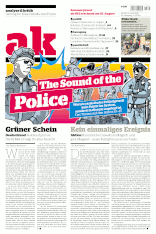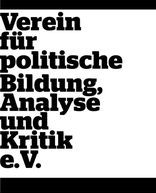Life in Suspense
Gender A group of students documented the living conditions of women in five refugee camps in Berlin
From the author collective
Approximately 17.000 refugees are still living in emergency accommodation centres in Berlin, 1.400 of them in gyms. All of the camps lack safety and privacy, health services and the access to information. The specific problems that refugee women face in the refugee camps are rarely talked about, even though self-organizations have long scandalized the conditions in the past and have demanded suitable accommodation. A group of students talked to 80 women in accommodation centres about their living conditions. They report on the restrictions they face in their daily life, but also structures of mutual help.
Everyday life
»I don’t like to be in the accommodation all day, I would rather go around and see what kind of country I am in here, I drink a coffee, go to LaGeSo, help my friends to find a place to live and then ... I work, it’s a hard job, badly paid, but I want do something, I don’t like sitting around waiting ... for what?« (Woman living in a central refugee camp)
Many of the refugee camps were not designed as spaces to live in, but are former factories, office premises or schools. Consequently, there is often a lack of sanitary facilities, spaces to properly store food, barrier-free access for disabled inhabitants and general comfort. A visitor described her first impression after entering the accommodation center:
»As is typical of institutionally run accommodation, all furnishings are standardized and a faint odour of industrial cleaning products is present. Each bedroom is furnished with twin-sized beds and yellow lockers similar to those found in schools. Due to sensitive calibrations, the fire alarm can be heard going off randomly at all times of day or night.«
The layout of refugee camps reflects the political agenda that applies to people who come to Germany in search of asylum. This type of accommodation of asylum seekers in camps reflects the aim of controlling and ruling the inhabitants. It is especially obvious in the emergency accommodation centers: In these facilities, asylum seekers must stay for a minimum of six weeks. In reality, they often have to stay there longer, up to several months. In the accomodation centers, autonomy and care for existential needs are very limited. Fara, a Palestinian woman from Syria living in an emergency camp in Berlin, described the uncertainty of her everyday life: »Waiting kills me – we are waiting for nothing.«
Social Contacts
»If you want to feel comfortable here, you have to create this feeling inside... So, if you come from a country where not so many residents are coming from, you have to be communicative and an open-minded person or find another way to feel at ease here... I’m the best example. I’m here by myself, but I know many women and I would definitely call them my friends, who I can rely on.« (Woman from a refugee camp)
Many women complained about non-existent or insufficient reliable childcare, depriving them of the chance to attend German courses and other activities offered in the centers. For emotional support as well as the exchange of information, the social contacts in the camps were crucial. Women who did not speak one of the more common languages often felt excluded because they missed a lot of information, experiences and contacts – for example concerning lawyers, doctors or support networks. The security personnel also predominantly spoke German and Arabic, therefore many women speaking other languages felt disadvantaged.
The women used social media in order to stay in contact with family members living in other cities or countries. Consequently, smartphones and a stable internet connection were extremely important. One woman from Syria, whose sister was living in Sweden, explained: »Even if I had a terrible day and nothing worked the way I wanted it, knowing that I can call my sister makes me feel less helpless. She understands me and we motivate each other.«
Health
»My scar from the cesarean section got infected because I was not able to shower every day. The midwife said I should try to wash the scar every day with warm water and not walk so much, but that is not possible. I have to wait in line at the showers, at the »Spendenausgabe« [distribution of donations] with my children.« (Sahar from Afghanistan, living in an emergency refugee camp)
Many women were generally satisfied with the health care provided in Germany, however they often faced barriers in accessing them. For some women, the living conditions in the camps were harming their physical or mental health. Limited mobility, allergies or special dietary requirements like diabetes were rarely considered. The absence of windows and poor aeration were a problem in Fara’s camp, a Palestinian woman from Syria: »I have asthma. I struggle with breathing and my daughters are always ill because of the bad air inside the camp.«
Because of the lack of sanitary facilities and possibilities to store food, infected wounds or food poisoning occurred. In camps who worked with laundry services outside the camp, clothes and even clothing donations were reported as remaining unhygienic and causing rashes, mycosis and lice. An Afghan woman living in an emergency camp recounted the difficulties she faced in providing for her child: »You can sometimes get diapers at the »Spendenausgabe« [distribution of donations]. You have to start to stand in line at 10 o'clock in the morning and they open at 3 o'clock in the afternoon. If they have no diapers, we use cloths that we wash in the bathrooms. We are not allowed to have electric kettles in our rooms, so we cannot wash the clothes properly.«
Language skills and informal information exchange played a crucial role in accessing health care. Therefore women provided each other with information about doctors and treatment options or organized informal translations. Lack of or poor translation were reported as being the essential problem in accessing medical care.
Bureaucracy and administration
»Waiting is a central element of daily life: waiting for official decisions, waiting for a forced return, waiting for the permission to work, waiting for one’s turn at the washing machine or in the food line, and waiting in front of the LaGeSo.« (Notes from one of the students visiting the camps)
Most of the women were busy with bureaucratic struggles for their own or family members’ right of residency. The asylum process includes multiple appointments at the Regional Office for Health and Social Affairs Berlin (LaGeSo) and other public authorities. For women with disabilities or little children the long waiting periods were particularly exhausting: standing in line for hours, the shoving and pushing of others waiting. Verena from Albania had to stand in line in front of the LaGeSo for an hour despite her having recently had leg surgery: »We had to go to the end [of the line] with these women, five or six women with children and me.«
The contact with the LaGeSo was often described as frustrating and confusing, the processes and criteria were unclear to many women. Additionally, bad translation influenced the applicants' access to information. Several women told us about cases in which LaGeSo case officers and translators transgressed their administrative duties by judging and commenting on the applicant’s moral right to even apply for asylum or file claims for specific services or needs. The women’s access to services depended heavily on their legal status and many women were not granted the right to language courses, child care or other public services. These differences also influenced the social contact between the women. Furthermore, the women were monitored by the institutions in which they lived: In some camps, the inhabitants had to wear bracelets with their registration number, the access to the camps was strictly regulated and often confined to visiting hours.
Safety and Privacy
»Once a woman got home late and was pushed into a room by several men. When the security staff intervened, they told the woman to not speak about the incident to the Heimleitung [camp management] in order to prevent trouble« (Woman from Afghanistan living in an emergency camp)
All five camps were surveyed by security personal. On the one hand, they were seen as a guarantee for safety by the residents, on the other hand they were a potential threat. At night and during weekends there was less security personal and there were generally few female security employees.
In many conversations, women voiced the lack of privacy, especially in emergency camps without separated or lockable rooms. In an emergency camp, Soraya, a refugee from Afghanistan, explained: »We women who wear the hijab cannot be free in the camp because of the men.« There was no area in the camp reserved for women; men could access everywhere. Therefore, some women continuously wore their head scarf and faced difficulties when they wanted to breast-feed.
Many female residents understood safety as the absence of war, terrorism and violence as well as a right to residency. Yet, the fear of downward mobility and sexual assault were present as well. Women felt vulnerable in the camps because the toilets and showers were not lockable.
In one emergency camp women reported that Germans from the area had thrown potatoes at the inhabitants in the first months and the police had to intervene several times. The camp director had warned the inhabitants of »racist German people trying to harm them«. Many women had either experienced racist assaults or discrimination or heard of incidents and felt therefore less secure in Germany.
Between January and April 2016 the author collective researched on refugee camps in Berlin. Email: autor_innenteam@riseup.net.
Research on refugee camps
From January to April 2016, female students of the Institute for Social and Cultural Anthropology of the Free University Berlin talked to 80 women at the time living in refugee camps in Berlin about their living conditions, problems and needs. The publication of the group aims at making women’s perspectives in refugee camps visible and providing information on problems regarding health care, administration, social life, safety and privacy. In the meantime, several of the interviewed women from Afghanistan and Albania were deported. The research project was developed in cooperation with the feminist group International Women’s Space (IWS). The IWS was founded in 2012 in the Gerhart-Hauptmann-Schule in Berlin-Kreuzberg when the former school was occupied by refugees. The IWS consists of migrant and refugee women from former colonized countries and women without these experiences. During the occupation of the school which lasted 17 months, the activists from IWS fought for a women-only space in the occupied building.
Hansjörg Dilger and Kristina Dohrn (Hg.), in Collaboration with International Women Space: Living in Refugee Camps in Berlin: Women’s Perspectives and Experiences, Berlin 2016.




 ak bei Facebook
ak bei Facebook
 ak bei Twitter
ak bei Twitter


 ak - analyse & kritik - zeitung für linke Debatte und Praxis
/ Nr. 623 / 17.1.2017
ak - analyse & kritik - zeitung für linke Debatte und Praxis
/ Nr. 623 / 17.1.2017